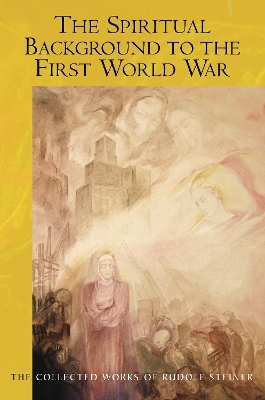
The Spiritual Background to the First World War
Rudolf Steiner Press (Verlag)
978-1-85584-661-6 (ISBN)
Speaking in the German city of Stuttgart during and after the war years, Steiner discusses the perpetual tension between East and West - particularly in relation to Europe. The war, he says, arose principally out of the Anglo-Saxon peoples' determination 'to exercise world-domination'. Knowing that Slavic culture is destined to be the precursor of the sixth cultural epoch, Western national interests resolved to make Eastern Europe - specifically Russia - 'the field for socialist experiments'. These events were aggravated by the failure of the Central European peoples in their own world-historical task, to 'rise to a broad sense of vision' as intermediaries between the two groups. Throughout, Steiner refers to the work of individual Folk Souls, but distinguishes them from the scourge of nationalism - especially when it is based on blood - whilst emphasizing the sovereignty of the individual human being.
Although more than a century old, the enduring themes of these previously-untranslated lectures will resonate with many readers today. The main text is supplemented with an introduction by Simon Blaxland-de Lange, editorial notes and an index.
Rudolf Steiner (1861-1925) was born in the small village of Kraljevec, Austro-Hungarian Empire (now in Croatia), where he grew up. As a young man, he lived in Weimar and Berlin, where he became a well-published scientific, literary, and philosophical scholar, known especially for his work with Goethe's scientific writings. At the beginning of the twentieth century, he began to develop his early philosophical principles into an approach to systematic research into psychological and spiritual phenomena. Formally beginning his spiritual teaching career under the auspices of the Theosophical Society, Steiner came to use the term Anthroposophy (and spiritual science) for his philosophy, spiritual research, and findings. The influence of Steiner's multifaceted genius has led to innovative and holistic approaches in medicine, various therapies, philosophy, religious renewal, Waldorf education, education for special needs, threefold economics, biodynamic agriculture, Goethean science, architecture, and the arts of drama, speech, and eurythmy. In 1924, Rudolf Steiner founded the General Anthroposophical Society, which today has branches throughout the world. He died in Dornach, Switzerland.
| Erscheinungsdatum | 21.05.2024 |
|---|---|
| Einführung | S. Blaxland-de Lange |
| Übersetzer | S. Blaxland-de Lange |
| Verlagsort | East Sussex |
| Sprache | englisch |
| Maße | 155 x 235 mm |
| Themenwelt | Geschichte ► Allgemeine Geschichte ► Neuzeit (bis 1918) |
| Weitere Fachgebiete ► Anthroposophie | |
| ISBN-10 | 1-85584-661-6 / 1855846616 |
| ISBN-13 | 978-1-85584-661-6 / 9781855846616 |
| Zustand | Neuware |
| Informationen gemäß Produktsicherheitsverordnung (GPSR) | |
| Haben Sie eine Frage zum Produkt? |
aus dem Bereich


